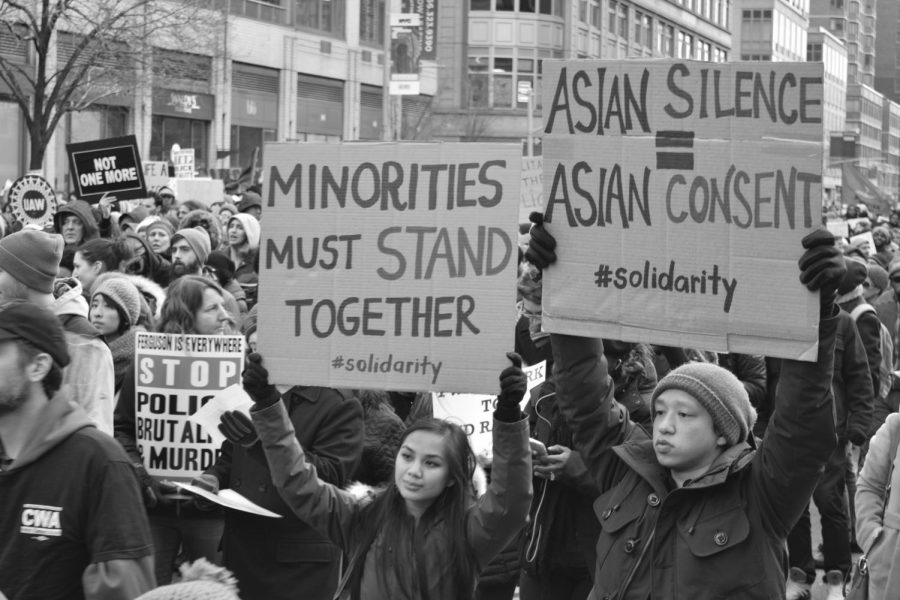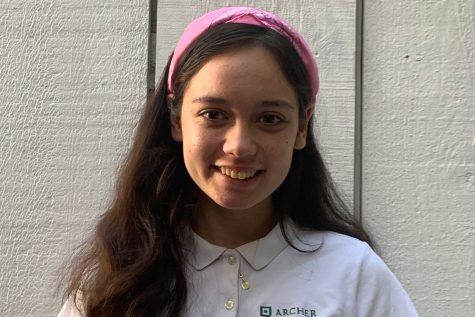‘I was horrified:’ APSU reflects on the rise in anti-Asian violence
Photo credit: Marcela McGreal from Creative Commons, licensed for reuse
Asian Americans at a 2014 protest in New York. Anti-Asian violence has surged in the past year, but many Asian and Pacific Islander Americans have felt the effects of anti-Asian rhetoric throughout their lives.
April 15, 2021
One month ago, 21-year-old Robert Aaron Long attacked three Asian-owned spas, killing eight people. Among the victims were six Asian women, which to many made this shooting one of the latest in a string of hate crimes against Asian Americans and Pacific Islanders (AAPIs).
But this attack, which occurred in Atlanta, GA on March 16, does not exist in a vacuum. Since mid-March 2020, STOP AAPI HATE, an incident-reporting center for Asian Americans, has received over 1,800 reports of pandemic-related Asian violence in 45 states.
“When I heard about like on the news how a lot of Asian elders were being like pushed in the street, it definitely was really surprising to me,” senior Kaitlyn Kim said. “I just assumed that people would be more informed and wouldn’t resort to violence. It also definitely made me feel really scared because I’m definitely afraid for my grandparents. If they were to go out in public, what would happen?”
Kim, a leader of the Asian Pacific Islander Student Union (APSU), and her fellow club leaders, believe that although there is a current spike in hate crimes, violence against Asian Americans is not new.
“Originally, children of Mongolian descent were put into separate schools labeled ‘Oriental schools.’ These laws were upheld until 2017.And then from 1942 to 1945, there were the Japanese internment camps. Following the Pearl Harbor attack, which forced Japanese Americans to leave their homes and be put into these camps,” senior and fellow APSU leader Emily Endo said. “In more recent history, after 9/11, there were many attacks against Muslim Americans and South Asians in general; anyone who Americans perceived as terrorists. And then in 2003 there was the SARS outbreak, which also led to violence against Americans similar to what we’re seeing here with COVID-19.”
Despite the long history of racism against Asians in America, the APSU leaders believe that former president Donald Trump fanned the flames of Asian hate.
“There’s not just one person to blame for this rhetoric, but a major contributor to a lot of these harmful statements was President Trump,” Kim said. “Especially when he labeled COVID-19 as the ‘Kung Flu‘ or the ‘Chinese virus.’ This also comes after a long history of his anti-immigrant rhetoric which is really created these divisions between white Americans and people of color.”
According to Director of Educational Technology Xiaorong Li, attacks against older Asian and women are particularly impactful for series of cultures which places emphasis on “respect” for elders. Li immigrated from China as an adult and spent many years living in San Francisco before moving to Los Angeles.
“Last night, I was taking a walk with my husband. Suddenly, because, I read all these cases, I just feel like, ‘Oh, I probably wouldn’t feel comfortable walking on my own just around this neighborhood at night without him,'” Li said. “It’s a terrible feeling. Because I know that Asian women and older Asian people are kind of being targeted.”
Especially following the attack in Atlanta, anti-Asian violence has gotten much attention on social media, with many sharing the hashtag #StopAsianHate.
“I think [social media] definitely is good for spreading awareness because I don’t think [anti-Asian violence] is an issue that’s as broadly talked about, especially on the news,” Endo said. “I don’t think it’s done as much with solving the issue or bringing into the conversation how to make change. This was an issue with Black Lives Matter [too]: performative activism. It’s definitely good [to have social media attention], but also there definitely needs to be more done to help solve this issue.”
On a larger level, Li said she is “still learning” how to be proactive in fighting against anti-Asian racism, because older generations of Asians have not been encouraged to do so.
“I experienced many many things and there were people yelling to me on the streets. I’m thinking now about how I responded to it, maybe I should be more proactive. … But coming from a different culture, it’s a learning experience and eventually you come up to a point where you want to choose to do something,” Li said. “That’s why, as much as I was very conditioned to not to be proactive, especially when it comes to political issues, I really feel like if we all started to pop in to bring awareness to people around us, then, over time, we’ll be able to see the difference.”
The students running APSU expressed some disappointment at the lack of discussion of these violent events at school. Kim, Endo and Chi believe that outside of affinity club discussions, education on Asian Americans and how their history relates to current events should be incorporated into classes.
“it was definitely interesting for me to do some research into the past policies in the US because I don’t think in our history classes, we really talked about a lot of Asian American discrimination,” Kim said.
Chi said she was “pretty disappointed” with the school-wide reaction to the increase in Asian violence, especially after the shooting in Atlanta. She expressed that some faculty members were “helpful” and made her feel “acknowledged,” but that she wished she had been given more support.
“For example, with the George Floyd incident, which is similar and also a hate crime, there was action. … Classes were canceled,” Chi said. “[It feels] like just because it was Asian people nothing happened and it took time for the school to actually come out with something or for anyone to say anything. It’s just disappointing.”
Dean of Students Jenn Babin said she was “really sorry that not all students felt supported.” She expressed that she was “grateful” to APSU for holding an affinity space and attempting to educate the larger community about anti-Asian violence.
“In times of tragedy or crisis, and there have been so many this year, students need and want different things. Some students want to talk about it. Others want to dive into school work and avoid the topic,” Babin wrote in an email. “All of that is appropriate, and it also makes it complicated to respond in a way that meets everyone’s needs. Student feedback is essential, and I appreciate those who are voicing their concerns.”
Babin also believes many teachers are planning to integrate these events into their courses as school resumes.
“I know that many teachers may be planning to continue discussions of violence against Asian-Americans after Spring Break,” Babin said. “I would encourage students who have a desire to continue the conversation or who feel that they need additional support to reach out so that Archer can create the spaces and resources necessary to make sure everyone feels heard and safe.”
Kim, Li, Endo and Chi believe that the approach to addressing these incidents must be complex and multifaceted.
“I personally don’t think there’s just one singular objective. I think there’s a lot of like goals,” Kim said. “[We should] educate people more on their own like bias because I think there’s just a lot of existing microaggressions that Asian Americans experience on a daily basis. … Also just I think putting in place moral laws to make sure that if there is harassment or discrimination that people are like fully brought to justice.”











Leo Chaudoir • Apr 15, 2021 at 11:56 pm
I went to pick up breakfast at our favorite hash house in San Mateo California. It’s a Filipino owned restaurant in what seemed a friendly city. It is run by the nicest family and I have been a customer for over 20 years. I was shocked to arrive to see the huge front windows shattered and vandalized. Such a hard working family struggling through the pandemic suddenly faced with thousands of dollars in broken glass repair.
Hatred seems to be everywhere. It makes no sense?